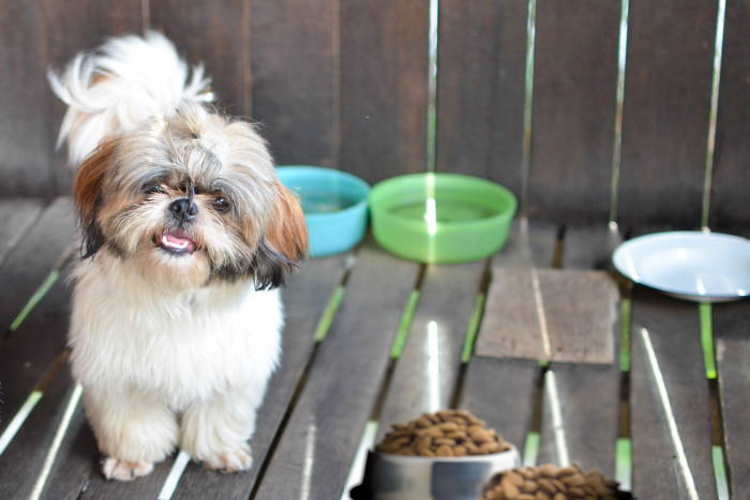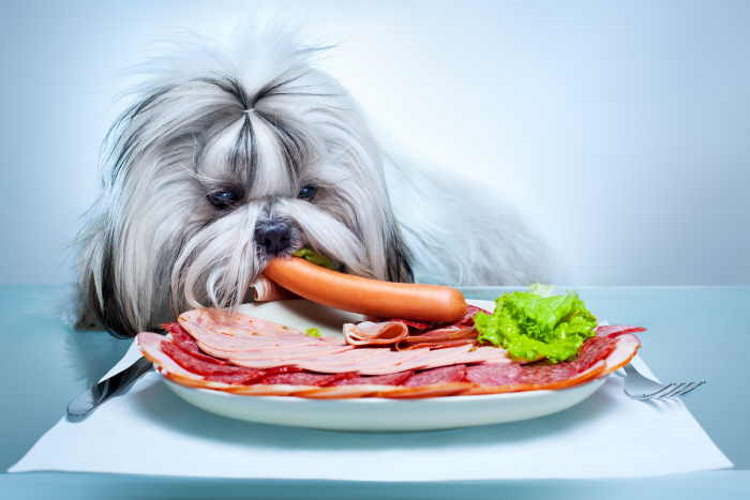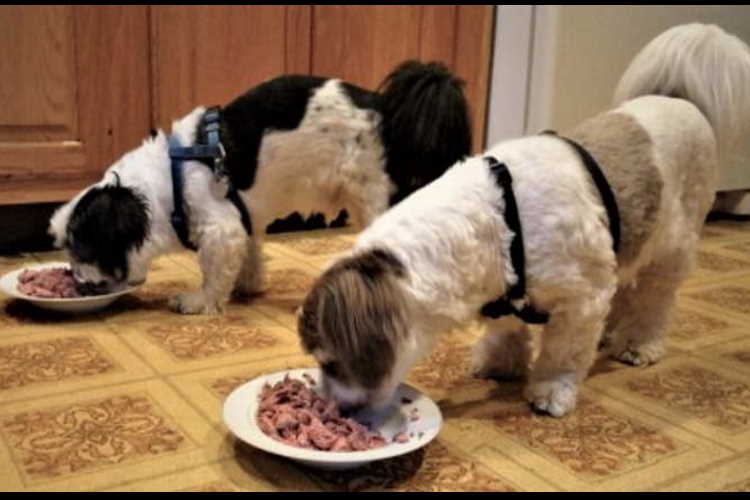- Home
- Shih Tzu diet
- how much food
How Much Food Does a Shih Tzu Eat a Day?
BY MOLLY | EVERYTHINGSHIHTZU.COM
This post may contain affiliate links. Read privacy & disclosure policy for info
Your Shih Tzu counts on you to know what’s best for her, and that means you do your due diligence when it comes to learning about what she needs.
Of course, you know your dog needs to eat, but have you taken the time to learn the details about your pup’s eating habits?
The amount of food your dog needs is not a one-size-fits-all kind of thing, it depends on a few factors.

The average Shih Tzu needs roughly 1 to 1.5 cups of food per day; however, this figure is influenced by many things. Your pet’s weight, activity level, type of food, age, and other unique situations all influence how much she eats.
Examples of these situations are weight management, senior dogs, and pets with certain health issues.
Really, the first step in learning how much food your Shih Tzu needs to eat is to learn about your Shih Tzu.
The average daily amount of food is a good starting point for most, but then don’t be surprised if you need to make a few adjustments.
Do you want to get a better idea of exactly what your furry friend should be eating every day? Then, read on!
How Do You Determine How Much Food Your Shih Tzu Needs?
The first step in determining the amount of food your Shih Tzu needs to eat is to get an accurate weight for your dog. Most feeding tables on dog food labels are based on a dog’s weight, not on the breed.
The average Shih Tzu weighs between 10 and 16 pounds, so you need to find out exactly where your dog lands in that range (or maybe she’s below or above it).
There are a couple of ways to find out your dog’s weight.
You can either take her to the vet and have her hop on the doggy scale, or you can do it yourself at home.
If you choose to do the latter here is what you do: hold your pup and step onto a scale, make a note of your combined weight, then weigh yourself minus Fluffy.
The difference between the two weights is how much your Shih Tzu weighs. Of course, this means you will have to weigh yourself, so proceed with caution.
Now that you know your dog’s weight, you can determine exactly how much food she needs!
If your dog is a puppy she will need about 1 ounce of food per pound of body weight.
Puppies need to consume more because they are still growing and have a higher activity level. Adult dogs eat about ½ ounce of food per pound of body weight.
Therefore, if your dog weighs 16 pounds, she will need roughly 8 ounces of food per day.
If you have a rambunctious little puppy, and he weighs five pounds, then he would need 5 ounces of food per day. You get the picture.

What Special Situations Can Influence the Amount of Food Your Shih Tzu Eats?
There are a few more things to consider when determining the amount of food your Shih Tzu should eat.
If your dog is a senior then she will need slightly fewer calories.
Adult dogs usually eat about 35 calories per pound of body weight, but a senior dog just needs about 30 calories.
Senior dogs are usually not as active as younger dogs, and their metabolism has slowed down a bit, meaning they don’t need as much fuel as they used to.
If your dog is overweight, that is another factor to consider.
You may want to discuss diet options with your vet and place your dog on a lower calorie food or a weight management product.
Your vet can offer recommendations and help you adopt a plan that is best for you and your pup.
Likewise, if your pet is underweight, adjustments will need to be made in her diet which may go beyond simply increasing her food intake, so it’s best to discuss this with your vet so your pup is as healthy as she can be.
If your dog has certain health issues, she may need to eat different food, or you may need to adjust how much she eats or when she eats.
Your dog could have a food allergy that affects what she can eat, or perhaps she has reflux issues or other health conditions that would warrant an alteration in her diet.
Once you have consulted with your vet, you’ll have the specific answers that you need for your Shih Tzu’s unique situation.
What if Your Shih Tzu Has Issues with Eating?
Obviously you hope that your dog will readily eat whatever food you give her and everything will be perfect, but sometimes it isn’t so easy.
Shih Tzu can be picky eaters, or perhaps your dog is having an issue with her teeth that makes it difficult for her to chew hard foods, or maybe she isn’t feeling well.
If you notice your dog not eating as usual, or not eating at all, talk to your vet. If you find that it’s an issue related to your pup’s teeth, your vet can fix anything that needs fixing, or you may need to switch to a softer food or just soften your dog’s dry food in warm water.
If your dog is ill or suffering from a stomach virus, she may not feel like eating overly rich foods or she may need to steer clear from a lot of fiber until she is feeling herself again.
Your vet may recommend giving your dog bland foods for one to two weeks, such as lean chicken and some white rice. Plain yogurt, full of probiotics, can also help if your dog has stomach upset. If your dog is constipated, feeding her some canned pumpkin can help; note that this is plain pumpkin, NOT pumpkin pie filling!
Still, sometimes your pup may feel perfectly fine, and just turn her nose up at the food you have chosen, welcome the picky eater.
This may mean you need to try several foods before you find one that your pup likes, just be careful how you transition her to a new food.
A sudden change in the dog food your pet eats can cause upset stomach and diarrhea.
Instead of a sudden switch, introduce a little of the new food into the old for a few days, gradually increasing the amount until you have completely replaced the old with the new.
How Should You Feed Your Shih Tzu?

Use a good quality dog food bowl to serve your pup her food, and make sure that she is given food only at feeding times.
Leaving food out all day can mean germs, plus it gives your dog the idea that she can eat all of the time. If she has access to food all day long, this can lead to obesity.
An adult pup should eat twice a day, and a puppy should eat about 4 times a day until about 6 months old. To do this, simply divide the daily amount of food by the number of feeding sessions so that you know how much food to put into your dog’s dish at each meal.
Make sure to get an accurate measuring device, either a measuring cup or scoop, as eyeballing it can lead to overfeeding.
- Home
- Shih Tzu diet
- how much food



